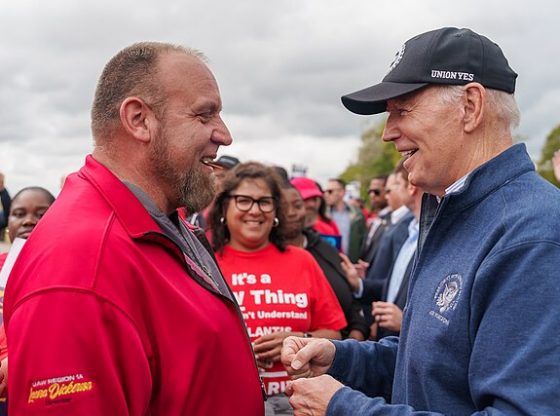President Joe Biden has come out in support of striking autoworkers but has contributed to those same workers’ woes by degrading real wages and facilitating the loss of union benefits, according to experts who spoke to the Daily Caller News Foundation.
The United Auto Workers (UAW) is currently striking at 44 manufacturing plants against the Big Three automakers — Ford, General Motors and Stellantis — following a failure of the parties to reach a new contract after the previous one’s expiration in September. Biden’s own actions and policies over the years have made things worse for auto workers through his inflationary spending policies that have degraded real wages and his hand in a concessions deal that took away key benefits under the Obama administration, according to experts who spoke to the DCNF.
“I think [Biden] has exacerbated the struggles facing UAW workers,” Rachel Greszler, senior research fellow at the Grover M. Hermann Center for the Federal Budget at the Heritage Foundation, told the DCNF.
Biden joined the picket line at a striking GM plant in September in a show of solidarity with UAW workers, urging the union to keep pushing for better pay in negotiations, according to Bloomberg.
The top demands of the union at the outset of the strike were a 46% wage increase over the course of the almost five-year contract, a 32-hour work week with no cut in pay, traditional pensions and cost-of-living adjustments, with the union arguing that workers’ pay and benefits are not commensurate with the pay increases of executives and in accordance with the recent profits generated by the companies.
Biden has repeatedly touted his role in the 2009 auto industry bailouts while serving as vice president. The bailout deal ultimately netted both GM and Chrysler a collective $80 billion by June of 2008, with the federal government owning 60% of GM and the UAW owning 55% of Chrysler, while Ford later took a loan in 2009 from the Department of Energy. The deal also provided government funding for the pensions of UAW members through the companies’ bankruptcies.
“President Obama and I rescued the auto industry and helped Michigan’s economy come roaring back,” Biden said in a tweet leading up to the 2020 election.
However, the Obama administration noted at the time that UAW made “important concessions” on workers’ wages and benefits as part of the broader bailout agreement. As part of the deal, auto union workers lost previously agreed-upon lump sum payments and cost of living adjustments in order to help auto companies stay afloat financially. The White House emphasized its role in facilitating the negotiations that created the bailout and concessions agreement to reporters and put no measure in place to restore benefits that were lost as a result, which have still not been regained by UAW workers.
Terry Bowman, a Ford autoworker who’s been on the job for nearly three decades, said many of the older autoworkers resent all the concessions that the union made around the bailout.
“The reason is that many old-time workers like me say they were better off 20 years ago than they are today,” Bowman, who is represented by the UAW but is not a dues-paying member, told the DCNF.
UAW workers have only received wage increases for six of the last 20 years, and none of those increases were more than 3% per year, with workers in years not receiving raises getting lump-sum payments instead, according to Bloomberg Law. In the six years preceding 2003, workers received 3% raises every year.
“Since Biden walked the picket line last week and replied ‘Yes’ when a reporter asked him if he believed autoworkers deserved a 40% raise, I believe he now owns the continuation of the strike and all the economic pain that tens of thousands will suffer through,” Bowman said. “[UAW President Shawn] Fain and Biden forget one important detail: the auto companies don’t have to build here in the U.S.”
Inflation is also a major reason auto workers are demanding substantial raises, which Heritage’s Grezler said can be blamed squarely on Biden’s big spending.
“Country-wide, it’s been massive spending increases,” Greszler told the DCNF. “We spent far too much during COVID — multiple rounds of stimulus — even when they were warned that this was going to be inflationary. Nevertheless, we’ve spent trillions of dollars beyond what was arguably needed, and that’s resulted in inflation.”
The Biden administration has pushed out trillions of dollars in new spending, sending the federal deficit to $33.5 trillion this year. Many economists argue these high-spending programs, such as the $1.9 trillion American Rescue Plan, have fueled inflation and eaten into America’s paychecks. Real wages have fallen 2.1% starting from when Biden first took office in the first quarter of 2021 to the second quarter of 2023, following a sustained period of high inflation.
Grezler says inflation can harm union workers more than non-union workers since their contracts lock them into set wage increases. While non-unionized workers can ask for a raise at any point if inflation starts to degrade their wages, unions agree to contracts about their wages and benefits often years ahead of time.
The autoworkers have also sought in their contract with the Big Three job protections as the automakers divert resources to their electric vehicle (EV) operations. Fain previously called the wages received at one EV plant “poverty-level,” as they are not covered under the same contract afforded to workers at plants that make internal combustion engine cars, further threatening the future of autoworkers who could be tossed out of their current jobs and contracts as companies continue to prioritize EVs.
Auto companies, including Rivian, Ford and GM, are reporting losses for each EV that they sell, while Stellantis will likely lose money once the company brings its line-up into the market in 2024. Ford is slated to lose $4.5 billion on EVs this year alone.
“UAW officials are acting like politicians who only care about getting more and more for their voting constituents now, without regard for the future,” Bowman told the DCNF. “After all, they won’t be in office in the future, and it will be someone else’s problem to deal with. We may be witnessing the beginning of the end of the American auto industry because the UAW and their politician cronies together may drive it all out of the country due to a subjective definition of “social and economic justice.”
The White House and the UAW didn’t respond to a request to comment from the DCNF.
Will Kessler on October 12, 2023












